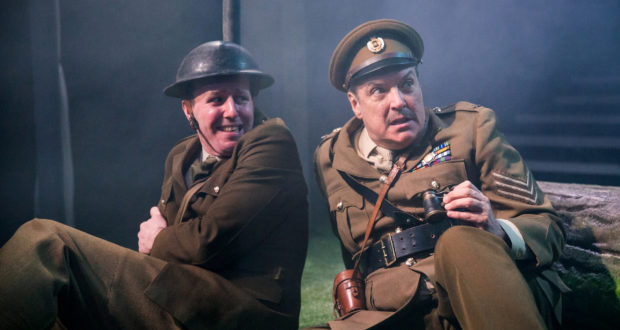Pros: Fine and energetic performance by Emily Tucker.
Cons: Muddled direction, confusing jumps through time, difficult to empathise or even engage with the characters. Although Ian Grant aims to create a play around the themes of politics, women and war, the result resembles more a confusing period drama as seen from the eyes of his male protagonist.
Summary
Rating
Poor
It’s not coincidence that After The Ball opened on 8th March, International Women’s Day. Nor is the year it has been produced, the hundredth anniversary of votes for women in the UK and the year in which the First World War, with its dozens of millions dead, ended. Although it’s around the important subjects of women, politics and war that Ian Grant intends to base his work on, the result appears to be instead an infidelity drama.
The play is the story of the Randall family (or rather just William Randall) from the outbreak of First World War until the mid-1970s. William (Stuart Fox) is a young militant of the British Socialist Party who sides with the right-wing split of the organisation in 1915 and voluntary enlists in the war. Before going to the front he marries Blanche (Julia Watson), a pacifist and suffragette opposed to his intentions of joining the military, and who gets pregnant just before he leaves for the continent. While in Belgium William falls in love with Marguerite (Elizabeth Healy), an affair Blanche finds out about and which deeply bitters their marriage. The story somehow repeats itself with Joyce (Emily Tucker), Blanche and William’s daughter, an activist in the Labour Party with a similar unsuccessful marriage.
The action moves back and forth in time without any kind of logical structure. It is confusing and doesn’t make much sense from the audience seats. At first you could think that’s how William, likely suffering from dementia, remembers his life from his care home armchair in the introductory scene at the beginning of the play. It could be that each random scene in time is a patch of memory disconnected from each other and which to this day still haunts him. However, this hypothesis quickly vanishes as there are many scenes without William in them, making it implausible that the arbitrary storyline is the product of his declining mind. It rather takes place inside the playwright’s head but without a common thread it’s difficult to make something coherent of it. What is consistent is the efforts of presenting the story from William’s point of view, with little regard to the female voices in it.
The fact that the same actors play the characters at different ages (youth, maturity and old age), and sometimes even different roles, only adds more confusion to the stage. This in itself shouldn’t be a problem and Time Productions mission to give leading roles to mature actors is indeed laudable and should be adopted more often in theatre and film. But considering that the plot of the play keeps randomly moving back and forth in time, one spends more time trying to figure out when is a scene happening instead of focusing on what is happening. We are given historical clues to help us trace the year (the split of the British Socialist Party in 1915, the Blitz, Harold Wilson 60’s and 70’s successive governments, etc.) but if History wasn’t your strong subject and you haven’t done your homework, you might leave the theatre feeling that you didn’t pass your History GCSE.
I found difficulty engaging with the leading actors. Stuart Fox as William appeared to be constantly itching and twirling. As young William he resembled more like Clint Eastwood in A Fistful of Dollars than a political activist. Julia Watson’s Blanche stays static through the times despite the traumatic and pivotal events in her life. The only change we notice is in her voice, from meek and docile in her youth to increasingly sharp and bitter as she gets older.
It’s a shame that despite having all the ingredients which could make this a remarkable, or at least interesting and enjoyable play, the result is so lousy.
Author: Ian Grant
Director: Nadia Papachronopoulou
Producer: Time Productions
Box Office: 020 8340 3488
Booking Link: http://www.upstairsatthegatehouse.com/
Booking Until: 24th March
 Everything Theatre Reviews, interviews and news for theatre lovers, London and beyond
Everything Theatre Reviews, interviews and news for theatre lovers, London and beyond



